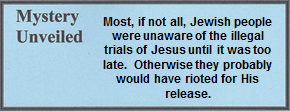15.04.10 Lk. 23:24-25 (See also Mt. 27:26; Mk. 15:15; Jn. 19:16)
BARABBAS IS RELEASED
24 So Pilate decided to grant their demand 25 and released the one they were asking for, who had been thrown into prison for rebellion and murder. But he handed Jesus over to their will.
“He handed Jesus over to their will.” The words of condemnation are not recorded in the gospels, but the customary declaration of death by crucifixion was spoken in Latin Ibis in crucem! Meaning “You mount the cross!”[1] This degrading and most horrible death was never permitted for a Roman citizen.

The dye was cast; the sentence was ordered; Jesus was ordered to “mount the cross.” More than three years earlier He began by His ministry with profound but simple sermons. A few people listened, but then the audiences grew. A few men of simple but various backgrounds accepted the opportunity to be the disciples of Someone who was uniquely different from other rabbis.
Then there was the profound miracle at Cana, followed by a few more miracles and then more disciples – a closed fellowship of a dozen. But when the blind were healed and demons were cast out; when bread and fishes were multiplied to feed thousands; He was the talk of the Middle East. For nearly the entire Inter-Testamental period – four hundred years – people had been anticipating a messiah who would give them the freedom they longed for. Certainly, they thought, this Man must be Him.
Another issue was the three messianic miracles. For centuries people asked their rabbis why lepers were not healed, how could the demons be cast out of a deaf and mute person if the exorcist could not speak to him, and healing someone who was born blind? All three conditions were assumed to be the result of the judgment of God, and only God could restore these people to their health. So when Jesus healed them, people were absolutely awestruck! Yet to them, Jesus was a man just like they were. They wondered how could He perform such God-like miracles. They could not accept the fact that the performance of these miracles was a profound statement that proclaimed His deity. And as if that was not enough, a greater miracle was in the forecast.
When Lazarus died, his body was in the grave four days before Jesus arrived on the scene. It was an assumed fact of life that the soul lingered around a body for three days after death, but after the face was decomposed, the soul left. So when Jesus raised Lazarus on the fourth day of death, He definitely demonstrated an act of God – restoring life to someone who was dead, dead, dead! No wonder everyone gathered palm and tree branches to greet Him as a King!
It was the common opinion that the messiah would announce his messiahship from the temple at Passover. When Jesus made His triumphal entry, it was on Passover – just what the people were expecting. The air was tense with excitement and anticipation for the common people, but equally fearful for the religious establishment with whom Jesus had numerous conflicts. They had to prevent a declaration of messiahship by Jesus by every means possible. But they were limited because of His incredible popularity – and it was only a few days until Passover.
But the Sadducees and leading Pharisees had a major problem: Their “man of the hour” was none other than Judas Iscariot. He was willing to betray Jesus so they could convene a last-minute late night court, obtain a guilty verdict, and convince the Romans to have Him crucified. When the people woke up on Friday morning and heard what happened during the night, they were devastated. They killed the Miracle-worker; the Man who healed the blind, the lame and those with hundreds of other ailments; they killed the Man of Promise in whom they had placed their hope for a bright future and a better tomorrow; they killed the One who people thought would overthrow the Roman occupation and re-establish the ancient Davidic Empire. Everyone was devastated. They wondered where was God in all this?[2]
But then came Sunday morning. Hallelujah! And the world was turned upside down.
[1]. Pixner, With Jesus in Jerusalem. 135.
[2]. See 17.02.03.B “The Popularity – Time Chart of the Ministry of Jesus.”